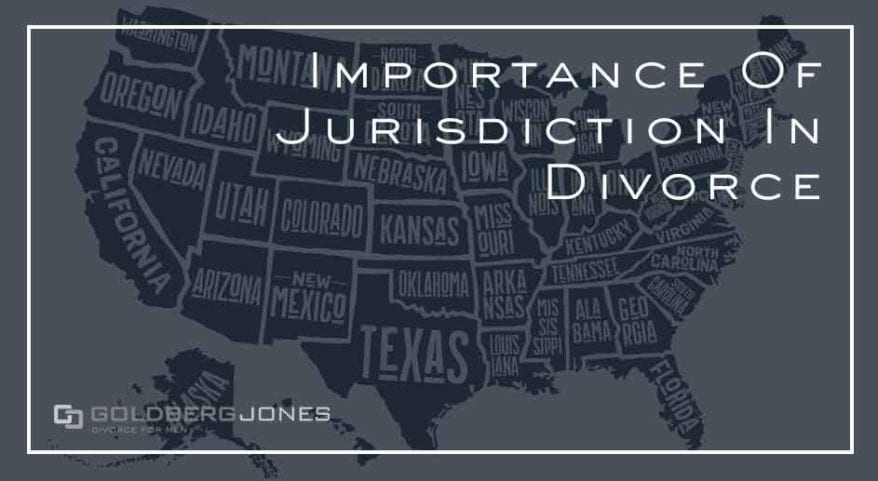So many factors impact your divorce. There’s the emotional turmoil, the decaying relationship, and whatever factors led you to end your marriage in the first place. From that one decision comes dozens more that further complicate the process. A huge one is where you decide to file for divorce. Because, as you’ll learn, jurisdiction has a major impact on your case.
How Does the Jurisdiction You Choose Affect Divorce And Child Custody?
If you and your spouse have established residency in a single state, you only really have one option about where to file for divorce.
But if you’ve recently moved, if the two of you live in different states, or even if you own homes elsewhere, all of that influences which state has jurisdiction over your case. Or at least it can.
Different states often have very, very different rules for divorce and custody. In some states, laws even vary by county.
For example, when it comes to the division of property, Oregon follows the equitable distribution model. Washington, on the other hand, is a community property state. This means the two states view, and thus divide, assets in specific ways.
And that’s just one area where jurisdiction comes into play.
States often have differences regarding custody, the child support formula, spousal support, and more. It may not always have a drastic influence, but you may find one state’s laws favor your case where another’s don’t.
However it works out, it’s an important topic to consider.
Related Reading: How Does Washington Divide Debt In Divorce?
 Where You File For Divorce
Where You File For Divorce
People often think you have to file for divorce in the state where you married. That’s not true.
You do, however, need to be a legal resident of the state where you file.
Some states require a waiting period after you become a resident before you can file. This keeps people from moving to a new state with favorable laws and divorcing right away, thus gaming the system.
Washington doesn’t work this way, but it does have certain stipulations.
You must be a Washington resident, a member of the armed forces stationed here, or married to a Washington resident or member of the military stationed here. If you check one of those boxes, you can file for divorce here.
When spouses live in different states, this also impacts jurisdiction.
For example, if your spouse lives in California, she can file there. If you both agree, you can file wherever you please.
In most cases, the state where the papers are ultimately filed maintains jurisdiction. This presents something to think about when considering filing. Timing may also be a factor.
Related Reading: Preparing for a Consultation With a Divorce Lawyer
Jurisdiction And Divorce
So how exactly does jurisdiction impact divorce? It can play into how financial matters shake out. Often, it influences how much time you spend with your children. In reality, it can and often does sway almost every aspect of the process.
- Division of Property: As said earlier, Washington follows community property practices when splitting up assets during a divorce. This is different from Oregon, which uses the equitable distribution model. Community property views all assets acquired during a marriage as equally belonging to both spouses. This has a significant influence on how courts allocate assets and debts. It’s essential to know how things vary from one jurisdiction to the next.
- Child Custody: Many factors influence custody decisions, and states weigh them all differently. The language often varies from state to state. Some states even allow non-blood relatives to vie for custody in certain cases. Deciding jurisdiction in custody cases is a complex issue, but more on that later.
- Child Support: Child support payments cover a child’s basic necessities. Things like food, shelter, medical care, and education. States generally follow a rigid formula to determine this number. It weighs various factors. You plug certain numbers into an equation and it produces an amount. But like other areas, variations to the formula occur as you cross state borders, which can cause major changes.
- Spousal Support: Spousal support doesn’t follow a strict formula like child support, but the goal remains similar. It aims to provide financial support for dependent spouses after divorce. In some cases, it only lasts a short time. In others, it continues indefinitely. As you probably guessed, how states approach this differs a great deal. Oregon, for example, has three specific types of spousal support. Washington, on the other hand, doesn’t, though payments tend to follow a pattern depending on things like the length of the marriage, earning potential, and financial need.
Related Reading: How Your Education Level Can Impact Rate of Divorce
How Children Impact Jurisdiction
Children tend to complicate matters in a divorce. Their presence impacts things emotionally, financially, and they can even play a part when it comes to determining jurisdiction.
We mentioned above how jurisdiction affects custody, but children can also influence where a case takes place.
Spouses can agree to which state has jurisdiction. But when a divorce involves a custody component, that decision isn’t always entirely up to the parents.
Things can get very complicated, which is where the Uniform Child Custody Jurisdiction and Enforcement Act comes in.
Created in the 1960s, and adopted by every state by the early 1980s, the UCCJEA sets out statutes that determine jurisdiction in custody child cases. A complex set of rules and regulations, it establishes the “home state” in these situations.
Under the UCCJEA, courts take many factors into account. Where the child has lived for the previous six months is a big component. If a child has significant connections in a state, that also plays a role. In grave circumstances, states can even declare emergency jurisdiction.
The goal is to serve the best interests of the child or children in question. This is already a traumatic time, and the laws aim to best help the children’s well-being. So, though you may want to file for divorce in one state, in certain situations another may hold jurisdiction.
These are only a few of the ways where you file for divorce matters. Jurisdiction can have a major influence in many areas when ending a marriage. Laws often vary in ways you don’t expect. As such, it’s vital to know the specific rules and regulations where your case will be heard.
If you have questions about your divorce, contact Goldberg Jones at our Seattle office. Our experienced attorneys are well-versed in Washington divorce and custody law.
Related Reading: What to Expect From Child Custody Hearings
